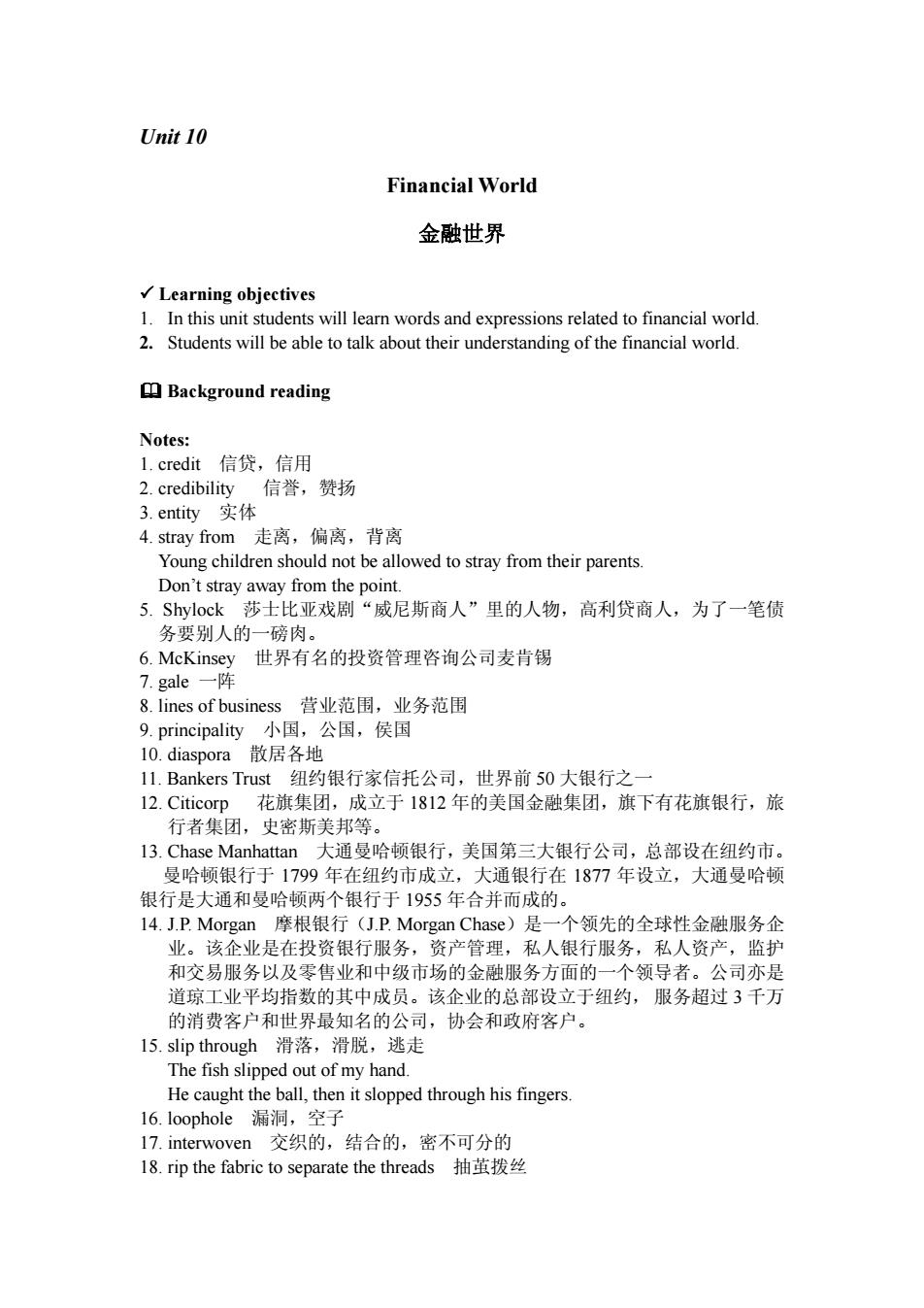
Unit 10 Financial World 金融世界 √Learning objectives 1.In this unit students will learn words and expressions related to financial world. 2.Students will be able to talk about their understanding of the financial world. Background reading Notes: 1.credit信贷,信用 2.credibility信誉,赞扬 3.entity实体 4.stray from走离,偏离,背离 Young children should not be allowed to stray from their parents. Don't stray away from the point. 5.Shylock莎士比亚戏剧“威尼斯商人”里的人物,高利贷商人,为了一笔债 务要别人的一磅肉。 6.McKinsey世界有名的投资管理咨询公司麦肯锡 7.gale一阵 8.lines of business营业范围,业务范围 9.principality小国,公国,侯国 10.diaspora散居各地 11.Bankers Trust纽约银行家信托公司,世界前50大银行之一 12.Citicorp花旗集团,成立于1812年的美国金融集团,旗下有花旗银行,旅 行者集团,史密斯美邦等。 l3.Chase Manhattan大通曼哈顿银行,美国第三大银行公司,总部设在纽约市。 曼哈顿银行于1799年在纽约市成立,大通银行在1877年设立,大通曼哈顿 银行是大通和曼哈顿两个银行于1955年合并而成的。 l4.J.P.Morgan摩根银行(JP.Morgan Chase)是一个领先的全球性金融服务企 业。该企业是在投资银行服务,资产管理,私人银行服务,私人资产,监护 和交易服务以及零售业和中级市场的金融服务方面的一个领导者。公司亦是 道琼工业平均指数的其中成员。该企业的总部设立于纽约,服务超过3千万 的消费客户和世界最知名的公司,协会和政府客户。 15.slip through滑落,滑脱,逃走 The fish slipped out of my hand He caught the ball,then it slopped through his fingers. 16.loophole漏洞,空子 17.interwoven交织的,结合的,密不可分的 l8.rip the fabric to separate the threads抽茧拨丝
Unit 10 Financial World 金融世界 3 Learning objectives 1. In this unit students will learn words and expressions related to financial world. 2. Students will be able to talk about their understanding of the financial world. Background reading Notes: 1. credit 信贷,信用 2. credibility 信誉,赞扬 3. entity 实体 4. stray from 走离,偏离,背离 Young children should not be allowed to stray from their parents. Don’t stray away from the point. 5. Shylock 莎士比亚戏剧“威尼斯商人”里的人物,高利贷商人,为了一笔债 务要别人的一磅肉。 6. McKinsey 世界有名的投资管理咨询公司麦肯锡 7. gale 一阵 8. lines of business 营业范围,业务范围 9. principality 小国,公国,侯国 10. diaspora 散居各地 11. Bankers Trust 纽约银行家信托公司,世界前 50 大银行之一 12. Citicorp 花旗集团,成立于 1812 年的美国金融集团,旗下有花旗银行,旅 行者集团,史密斯美邦等。 13. Chase Manhattan 大通曼哈顿银行,美国第三大银行公司,总部设在纽约市。 曼哈顿银行于 1799 年在纽约市成立,大通银行在 1877 年设立,大通曼哈顿 银行是大通和曼哈顿两个银行于 1955 年合并而成的。 14. J.P. Morgan 摩根银行(J.P. Morgan Chase)是一个领先的全球性金融服务企 业。该企业是在投资银行服务,资产管理,私人银行服务,私人资产,监护 和交易服务以及零售业和中级市场的金融服务方面的一个领导者。公司亦是 道琼工业平均指数的其中成员。该企业的总部设立于纽约, 服务超过 3 千万 的消费客户和世界最知名的公司,协会和政府客户。 15. slip through 滑落,滑脱,逃走 The fish slipped out of my hand. He caught the ball, then it slopped through his fingers. 16. loophole 漏洞,空子 17. interwoven 交织的,结合的,密不可分的 18. rip the fabric to separate the threads 抽茧拨丝
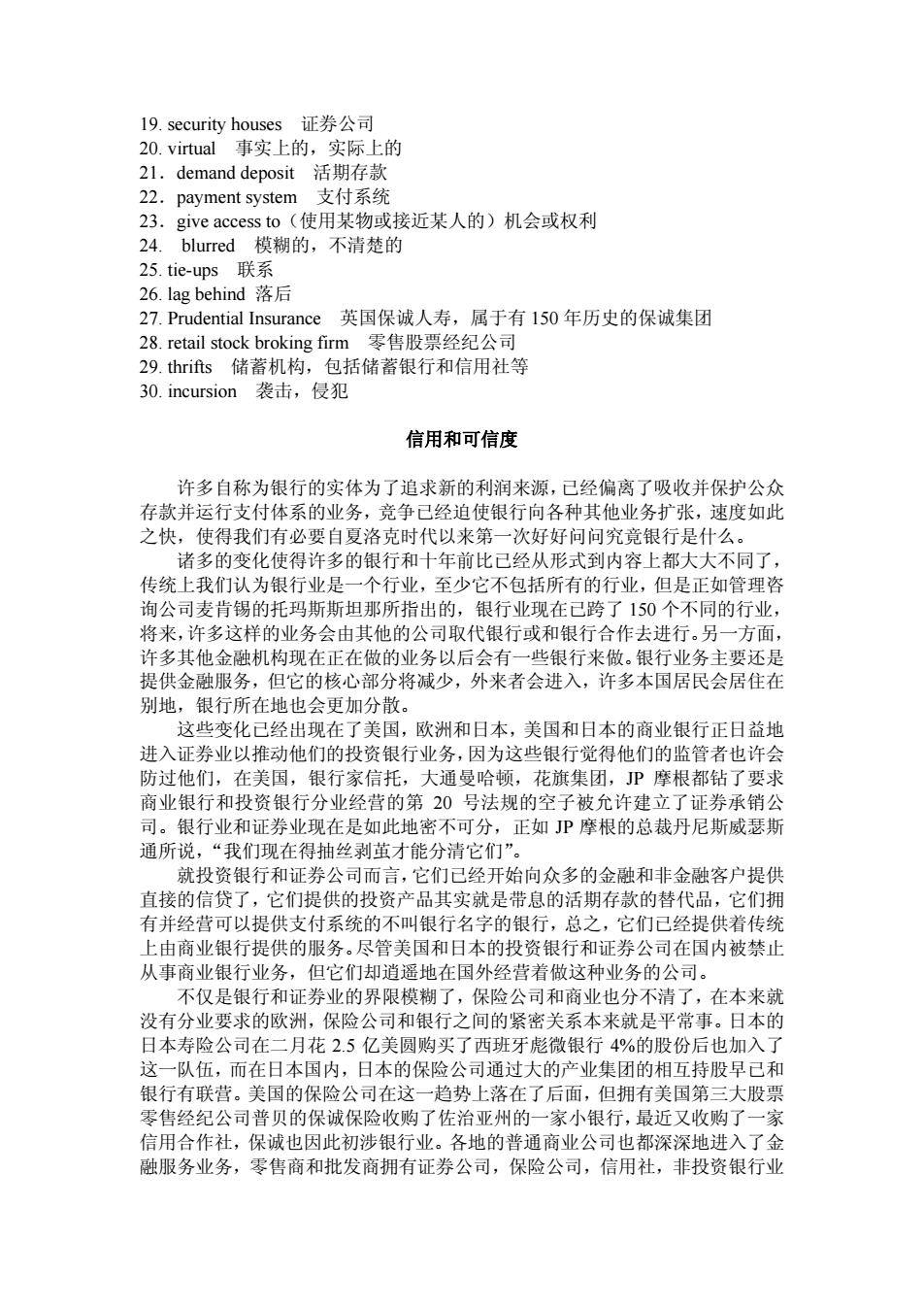
19.security houses证券公司 20.virtual事实上的,实际上的 2l.demand deposit活期存款 22.payment system支付系统 23.give access to(使用某物或接近某人的)机会或权利 24.blurred模糊的,不清楚的 25.tie-ups联系 26.lag behind落后 27.Prudential Insurance英国保诚人寿,属于有150年历史的保诚集团 28.retail stock broking firm零售股票经纪公司 29.thrifts储蓄机构,包括储蓄银行和信用社等 30.incursion袭击,侵犯 信用和可信度 许多自称为银行的实体为了追求新的利润来源,已经偏离了吸收并保护公众 存款并运行支付体系的业务,竞争己经迫使银行向各种其他业务扩张,速度如此 之快,使得我们有必要自夏洛克时代以来第一次好好问问究竟银行是什么。 诸多的变化使得许多的银行和十年前比已经从形式到内容上都大大不同了, 传统上我们认为银行业是一个行业,至少它不包括所有的行业,但是正如管理咨 询公司麦肯锡的托玛斯斯坦那所指出的,银行业现在已跨了150个不同的行业, 将来,许多这样的业务会由其他的公司取代银行或和银行合作去进行。另一方面, 许多其他金融机构现在正在做的业务以后会有一些银行来做。银行业务主要还是 提供金融服务,但它的核心部分将减少,外来者会进入,许多本国居民会居住在 别地,银行所在地也会更加分散。 这些变化已经出现在了美国,欧洲和日本,美国和日本的商业银行正日益地 进入证券业以推动他们的投资银行业务,因为这些银行觉得他们的监管者也许会 防过他们,在美国,银行家信托,大通曼哈顿,花旗集团,P摩根都钻了要求 商业银行和投资银行分业经营的第20号法规的空子被允许建立了证券承销公 司。银行业和证券业现在是如此地密不可分,正如P摩根的总裁丹尼斯威瑟斯 通所说,“我们现在得抽丝剥茧才能分清它们”。 就投资银行和证券公司而言,它们己经开始向众多的金融和非金融客户提供 直接的信贷了,它们提供的投资产品其实就是带息的活期存款的替代品,它们拥 有并经营可以提供支付系统的不叫银行名字的银行,总之,它们已经提供着传统 上由商业银行提供的服务。尽管美国和日本的投资银行和证券公司在国内被禁止 从事商业银行业务,但它们却逍遥地在国外经营着做这种业务的公司。 不仅是银行和证券业的界限模糊了,保险公司和商业也分不清了,在本来就 没有分业要求的欧洲,保险公司和银行之间的紧密关系本来就是平常事。日本的 日本寿险公司在二月花2.5亿美圆购买了西班牙彪微银行4%的股份后也加入了 这一队伍,而在日本国内,日本的保险公司通过大的产业集团的相互持股早已和 银行有联营。美国的保险公司在这一趋势上落在了后面,但拥有美国第三大股票 零售经纪公司普贝的保诚保险收购了佐治亚州的一家小银行,最近又收购了一家 信用合作社,保诚也因此初涉银行业。各地的普通商业公司也都深深地进入了金 融服务业务,零售商和批发商拥有证券公司,保险公司,信用社,非投资银行业
19. security houses 证券公司 20. virtual 事实上的,实际上的 21.demand deposit 活期存款 22.payment system 支付系统 23.give access to(使用某物或接近某人的)机会或权利 24. blurred 模糊的,不清楚的 25. tie-ups 联系 26. lag behind 落后 27. Prudential Insurance 英国保诚人寿,属于有 150 年历史的保诚集团 28. retail stock broking firm 零售股票经纪公司 29. thrifts 储蓄机构,包括储蓄银行和信用社等 30. incursion 袭击,侵犯 信用和可信度 许多自称为银行的实体为了追求新的利润来源,已经偏离了吸收并保护公众 存款并运行支付体系的业务,竞争已经迫使银行向各种其他业务扩张,速度如此 之快,使得我们有必要自夏洛克时代以来第一次好好问问究竟银行是什么。 诸多的变化使得许多的银行和十年前比已经从形式到内容上都大大不同了, 传统上我们认为银行业是一个行业,至少它不包括所有的行业,但是正如管理咨 询公司麦肯锡的托玛斯斯坦那所指出的,银行业现在已跨了 150 个不同的行业, 将来,许多这样的业务会由其他的公司取代银行或和银行合作去进行。另一方面, 许多其他金融机构现在正在做的业务以后会有一些银行来做。银行业务主要还是 提供金融服务,但它的核心部分将减少,外来者会进入,许多本国居民会居住在 别地,银行所在地也会更加分散。 这些变化已经出现在了美国,欧洲和日本,美国和日本的商业银行正日益地 进入证券业以推动他们的投资银行业务,因为这些银行觉得他们的监管者也许会 防过他们,在美国,银行家信托,大通曼哈顿,花旗集团,JP 摩根都钻了要求 商业银行和投资银行分业经营的第 20 号法规的空子被允许建立了证券承销公 司。银行业和证券业现在是如此地密不可分,正如 JP 摩根的总裁丹尼斯威瑟斯 通所说,“我们现在得抽丝剥茧才能分清它们”。 就投资银行和证券公司而言,它们已经开始向众多的金融和非金融客户提供 直接的信贷了,它们提供的投资产品其实就是带息的活期存款的替代品,它们拥 有并经营可以提供支付系统的不叫银行名字的银行,总之,它们已经提供着传统 上由商业银行提供的服务。尽管美国和日本的投资银行和证券公司在国内被禁止 从事商业银行业务,但它们却逍遥地在国外经营着做这种业务的公司。 不仅是银行和证券业的界限模糊了,保险公司和商业也分不清了,在本来就 没有分业要求的欧洲,保险公司和银行之间的紧密关系本来就是平常事。日本的 日本寿险公司在二月花 2.5 亿美圆购买了西班牙彪微银行 4%的股份后也加入了 这一队伍,而在日本国内,日本的保险公司通过大的产业集团的相互持股早已和 银行有联营。美国的保险公司在这一趋势上落在了后面,但拥有美国第三大股票 零售经纪公司普贝的保诚保险收购了佐治亚州的一家小银行,最近又收购了一家 信用合作社,保诚也因此初涉银行业。各地的普通商业公司也都深深地进入了金 融服务业务,零售商和批发商拥有证券公司,保险公司,信用社,非投资银行业
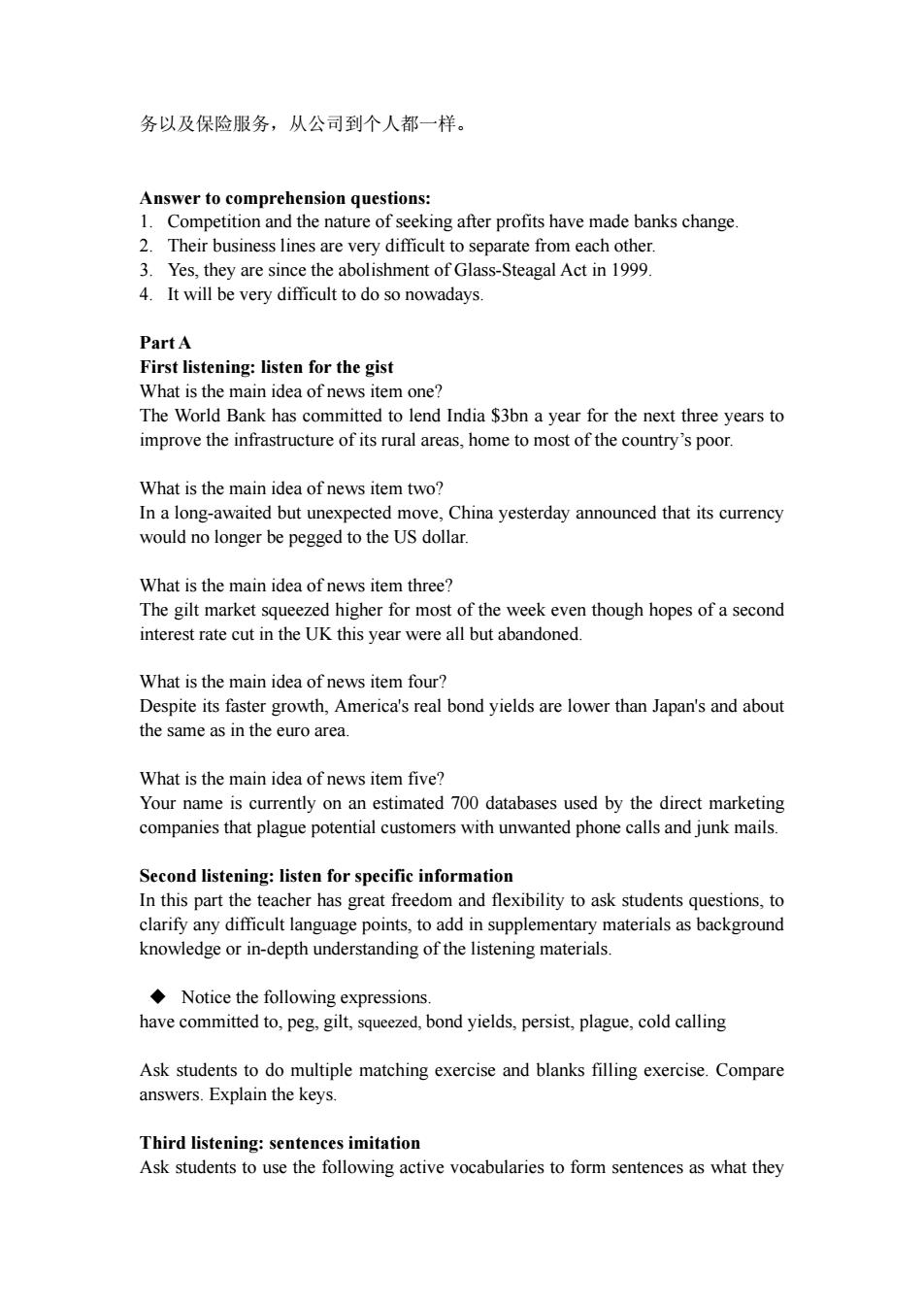
务以及保险服务,从公司到个人都一样。 Answer to comprehension questions: 1.Competition and the nature of seeking after profits have made banks change. 2.Their business lines are very difficult to separate from each other 3.Yes,they are since the abolishment of Glass-Steagal Act in 1999. 4.It will be very difficult to do so nowadays. PartA First listening:listen for the gist What is the main idea of news item one? The World Bank has committed to lend India $3bn a year for the next three years to improve the infrastructure of its rural areas,home to most of the country's poor. What is the main idea of news item two? In a long-awaited but unexpected move,China yesterday announced that its currency would no longer be pegged to the US dollar. What is the main idea of news item three? The gilt market squeezed higher for most of the week even though hopes of a second interest rate cut in the UK this year were all but abandoned. What is the main idea of news item four? Despite its faster growth,America's real bond yields are lower than Japan's and about the same as in the euro area. What is the main idea of news item five? Your name is currently on an estimated 700 databases used by the direct marketing companies that plague potential customers with unwanted phone calls and junk mails. Second listening:listen for specific information In this part the teacher has great freedom and flexibility to ask students questions,to clarify any difficult language points,to add in supplementary materials as background knowledge or in-depth understanding of the listening materials. Notice the following expressions. have committed to,peg,gilt,squeezed,bond yields,persist,plague,cold calling Ask students to do multiple matching exercise and blanks filling exercise.Compare answers.Explain the keys. Third listening:sentences imitation Ask students to use the following active vocabularies to form sentences as what they
务以及保险服务,从公司到个人都一样。 Answer to comprehension questions: 1. Competition and the nature of seeking after profits have made banks change. 2. Their business lines are very difficult to separate from each other. 3. Yes, they are since the abolishment of Glass-Steagal Act in 1999. 4. It will be very difficult to do so nowadays. Part A First listening: listen for the gist What is the main idea of news item one? The World Bank has committed to lend India $3bn a year for the next three years to improve the infrastructure of its rural areas, home to most of the country’s poor. What is the main idea of news item two? In a long-awaited but unexpected move, China yesterday announced that its currency would no longer be pegged to the US dollar. What is the main idea of news item three? The gilt market squeezed higher for most of the week even though hopes of a second interest rate cut in the UK this year were all but abandoned. What is the main idea of news item four? Despite its faster growth, America's real bond yields are lower than Japan's and about the same as in the euro area. What is the main idea of news item five? Your name is currently on an estimated 700 databases used by the direct marketing companies that plague potential customers with unwanted phone calls and junk mails. Second listening: listen for specific information In this part the teacher has great freedom and flexibility to ask students questions, to clarify any difficult language points, to add in supplementary materials as background knowledge or in-depth understanding of the listening materials. Notice the following expressions. have committed to, peg, gilt, squeezed, bond yields, persist, plague, cold calling Ask students to do multiple matching exercise and blanks filling exercise. Compare answers. Explain the keys. Third listening: sentences imitation Ask students to use the following active vocabularies to form sentences as what they
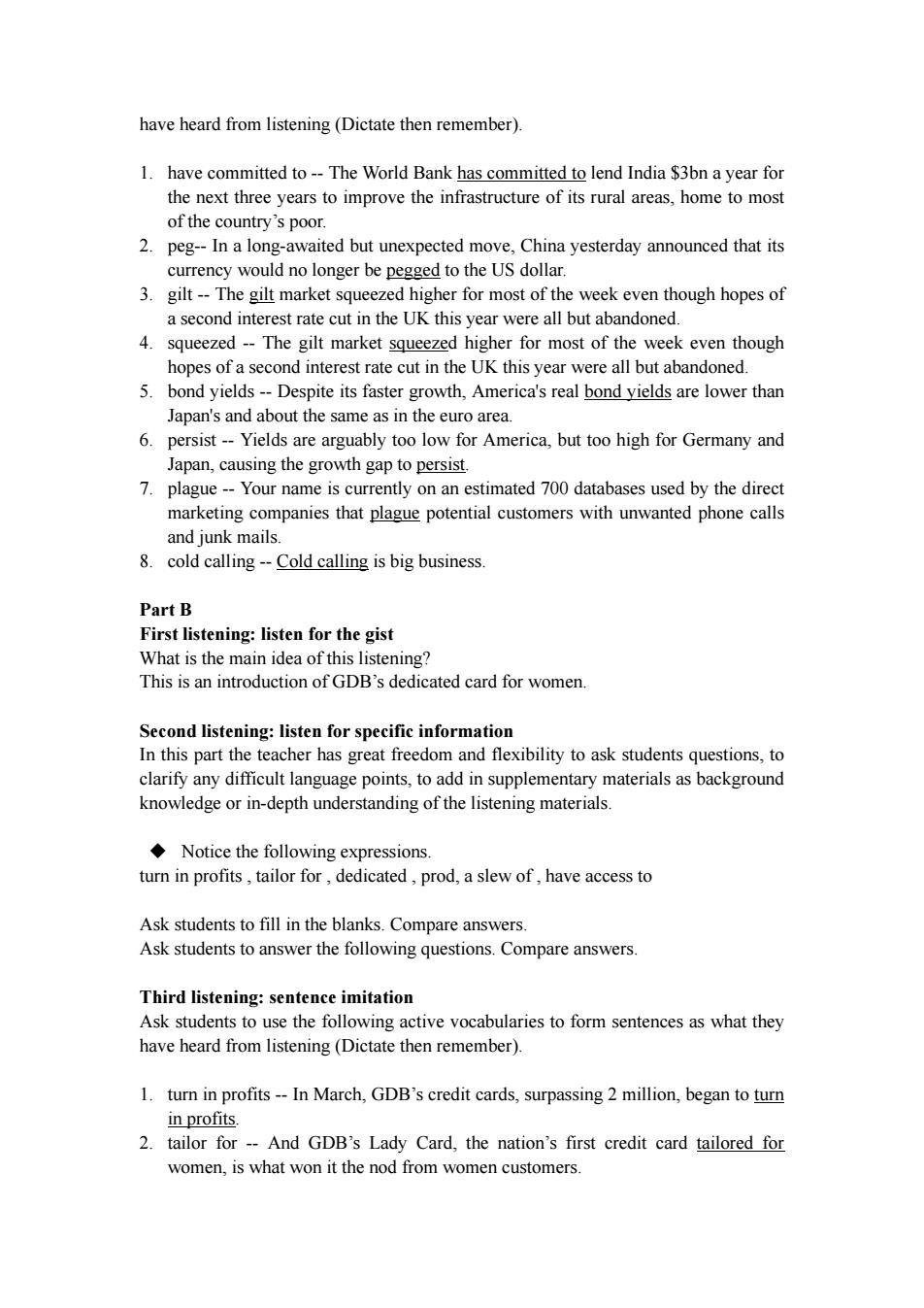
have heard from listening(Dictate then remember). 1.have committed to--The World Bank has committed to lend India $3bn a year for the next three years to improve the infrastructure of its rural areas,home to most of the country's poor. 2.peg--In a long-awaited but unexpected move,China yesterday announced that its currency would no longer be pegged to the US dollar. 3.gilt--The gilt market squeezed higher for most of the week even though hopes of a second interest rate cut in the UK this year were all but abandoned. 4.squeezed--The gilt market squeezed higher for most of the week even though hopes of a second interest rate cut in the UK this year were all but abandoned. 5.bond yields--Despite its faster growth,America's real bond yields are lower than Japan's and about the same as in the euro area. 6.persist--Yields are arguably too low for America,but too high for Germany and Japan,causing the growth gap to persist. 7.plague--Your name is currently on an estimated 700 databases used by the direct marketing companies that plague potential customers with unwanted phone calls and junk mails. 8.cold calling--Cold calling is big business. Part B First listening:listen for the gist What is the main idea of this listening? This is an introduction of GDB's dedicated card for women. Second listening:listen for specific information In this part the teacher has great freedom and flexibility to ask students questions,to clarify any difficult language points,to add in supplementary materials as background knowledge or in-depth understanding of the listening materials. Notice the following expressions. turn in profits,tailor for,dedicated,prod,a slew of,have access to Ask students to fill in the blanks.Compare answers. Ask students to answer the following questions.Compare answers. Third listening:sentence imitation Ask students to use the following active vocabularies to form sentences as what they have heard from listening (Dictate then remember). 1.turn in profits--In March,GDB's credit cards,surpassing 2 million,began to turn in profits 2.tailor for--And GDB's Lady Card,the nation's first credit card tailored for women,is what won it the nod from women customers
have heard from listening (Dictate then remember). 1. have committed to -- The World Bank has committed to lend India $3bn a year for the next three years to improve the infrastructure of its rural areas, home to most of the country’s poor. 2. peg-- In a long-awaited but unexpected move, China yesterday announced that its currency would no longer be pegged to the US dollar. 3. gilt -- The gilt market squeezed higher for most of the week even though hopes of a second interest rate cut in the UK this year were all but abandoned. 4. squeezed -- The gilt market squeezed higher for most of the week even though hopes of a second interest rate cut in the UK this year were all but abandoned. 5. bond yields -- Despite its faster growth, America's real bond yields are lower than Japan's and about the same as in the euro area. 6. persist -- Yields are arguably too low for America, but too high for Germany and Japan, causing the growth gap to persist. 7. plague -- Your name is currently on an estimated 700 databases used by the direct marketing companies that plague potential customers with unwanted phone calls and junk mails. 8. cold calling -- Cold calling is big business. Part B First listening: listen for the gist What is the main idea of this listening? This is an introduction of GDB’s dedicated card for women. Second listening: listen for specific information In this part the teacher has great freedom and flexibility to ask students questions, to clarify any difficult language points, to add in supplementary materials as background knowledge or in-depth understanding of the listening materials. Notice the following expressions. turn in profits , tailor for , dedicated , prod, a slew of , have access to Ask students to fill in the blanks. Compare answers. Ask students to answer the following questions. Compare answers. Third listening: sentence imitation Ask students to use the following active vocabularies to form sentences as what they have heard from listening (Dictate then remember). 1. turn in profits -- In March, GDB’s credit cards, surpassing 2 million, began to turn in profits. 2. tailor for -- And GDB’s Lady Card, the nation’s first credit card tailored for women, is what won it the nod from women customers

3.dedicated--GDB issued its first credit card in 1995 and its dedicated card for women came in 2002. 4.prod--This is what prodded GDB to introduce its Lady Card 5.a slew of--Besides the usual benefits such as nationwide use,cash overdraws and no need for guarantors,the Lady card comes with a slew of services for women such as exclusive Web pages,free information,an online club and various insurance plans. 6.have access to --Cardholders also have access to travel and entertainment information and can book air tickets,make hotel reservations and even book tickets to music concerts. Part C First listening:listen for the gist What is the main idea of this listening? This passage mainly discusses different strategies of foreign investments in Chinese banking sector. Second listening:listen for specific information In this part the teacher has great freedom and flexibility to ask students questions,to clarify any difficult language points,to add in supplementary materials as background knowledge or in-depth understanding of the listening materials. Notice the following expressions. have aspects of,stake out,askance,plead,squander,lax,envisage,cede,float, Ask students to do the T/F exercises.Ask them why the statements are true or false.. Ask students to answer the questions and make comments. Third listening:sentence imitation Ask students to use the following active vocabularies to form sentences as what they have heard from listening(Dictate then remember). 1.have aspects of--The wave of foreign investment into China's banking system has aspects of a gold rush.. 2.stake out --Foreign banks are staking out territory in promising but highly uncertain terrain. 3.askance--Shareholders generally look askance at such "strategic investment"- preferring that companies either acquire target business outright or do not invest in them at all. 4.plead--Those buying stakes in China plead special circumstances,with some justification. 5.squander--Nonetheless,there is clearly a risk that their capital will be squandered by managements better known for growing loans than for controlling bad debts. 6.lax--True value,though,is hard to establish,given lax accounting and a flood of
3. dedicated -- GDB issued its first credit card in 1995 and its dedicated card for women came in 2002. 4. prod-- This is what prodded GDB to introduce its Lady Card 5. a slew of -- Besides the usual benefits such as nationwide use, cash overdraws and no need for guarantors, the Lady card comes with a slew of services for women such as exclusive Web pages, free information, an online club and various insurance plans. 6. have access to -- Cardholders also have access to travel and entertainment information and can book air tickets, make hotel reservations and even book tickets to music concerts. Part C First listening: listen for the gist What is the main idea of this listening? This passage mainly discusses different strategies of foreign investments in Chinese banking sector. Second listening: listen for specific information In this part the teacher has great freedom and flexibility to ask students questions, to clarify any difficult language points, to add in supplementary materials as background knowledge or in-depth understanding of the listening materials. Notice the following expressions. have aspects of, stake out, askance, plead, squander, lax, envisage, cede, float, Ask students to do the T/F exercises. Ask them why the statements are true or false.. Ask students to answer the questions and make comments. Third listening: sentence imitation Ask students to use the following active vocabularies to form sentences as what they have heard from listening (Dictate then remember). 1. have aspects of -- The wave of foreign investment into China’s banking system has aspects of a gold rush.. 2. stake out -- Foreign banks are staking out territory in promising but highly uncertain terrain. 3. askance -- Shareholders generally look askance at such “strategic investment” – preferring that companies either acquire target business outright or do not invest in them at all. 4. plead -- Those buying stakes in China plead special circumstances, with some justification. 5. squander-- Nonetheless, there is clearly a risk that their capital will be squandered by managements better known for growing loans than for controlling bad debts. 6. lax -- True value, though, is hard to establish, given lax accounting and a flood of
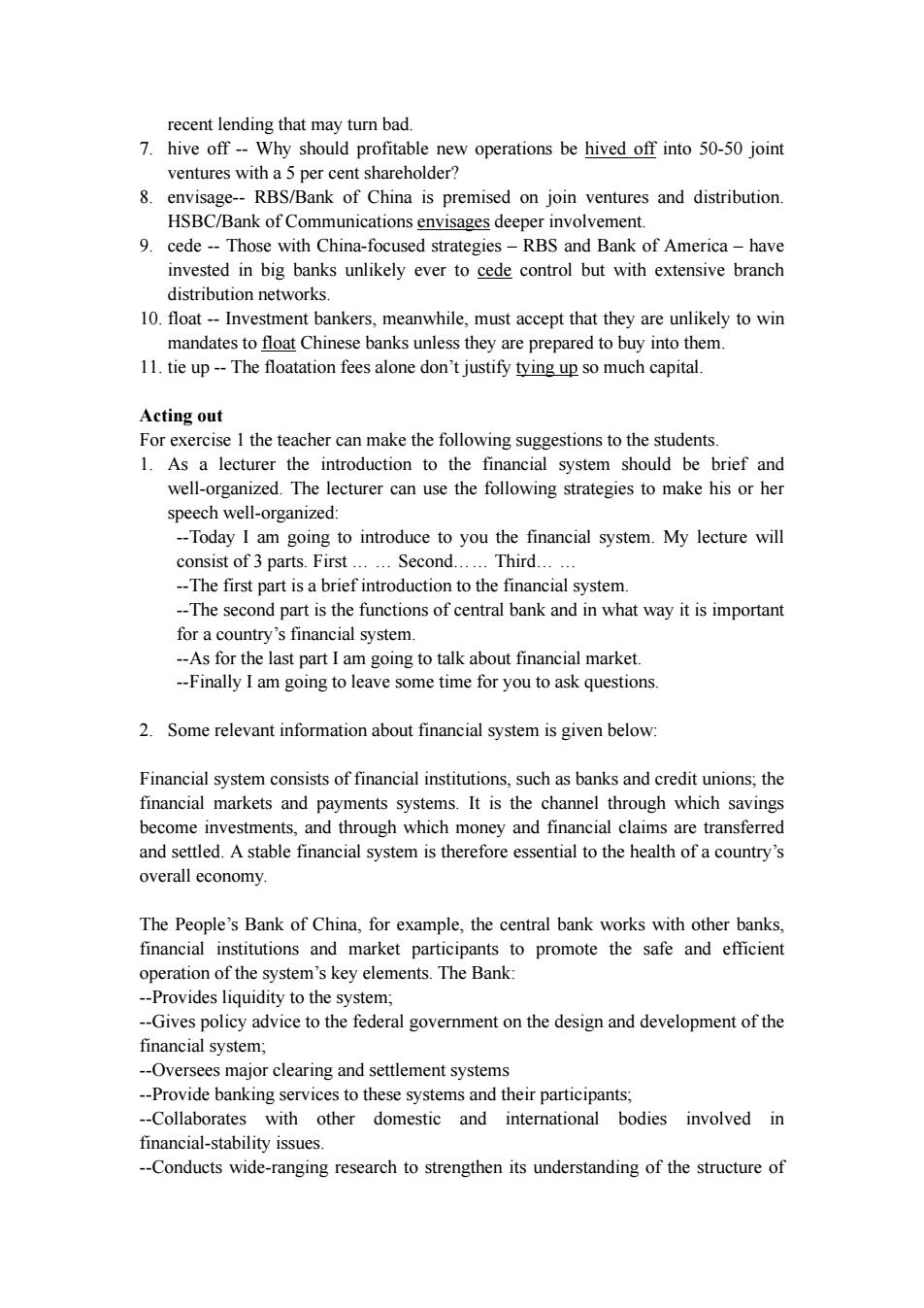
recent lending that may turn bad. 7.hive off--Why should profitable new operations be hived off into 50-50 joint ventures with a 5 per cent shareholder? 8.envisage--RBS/Bank of China is premised on join ventures and distribution HSBC/Bank of Communications envisages deeper involvement. 9.cede--Those with China-focused strategies-RBS and Bank of America-have invested in big banks unlikely ever to cede control but with extensive branch distribution networks. 10.float--Investment bankers,meanwhile,must accept that they are unlikely to win mandates to float Chinese banks unless they are prepared to buy into them. 11.tie up--The floatation fees alone don't justify tying up so much capital. Acting out For exercise 1 the teacher can make the following suggestions to the students. 1.As a lecturer the introduction to the financial system should be brief and well-organized.The lecturer can use the following strategies to make his or her speech well-organized: --Today I am going to introduce to you the financial system.My lecture will consist of 3 parts.First......Second......Third...... --The first part is a brief introduction to the financial system. --The second part is the functions of central bank and in what way it is important for a country's financial system. --As for the last part I am going to talk about financial market. --Finally I am going to leave some time for you to ask questions. 2.Some relevant information about financial system is given below: Financial system consists of financial institutions,such as banks and credit unions;the financial markets and payments systems.It is the channel through which savings become investments,and through which money and financial claims are transferred and settled.A stable financial system is therefore essential to the health of a country's overall economy. The People's Bank of China,for example,the central bank works with other banks, financial institutions and market participants to promote the safe and efficient operation of the system's key elements.The Bank: --Provides liquidity to the system; --Gives policy advice to the federal government on the design and development of the financial system; --Oversees major clearing and settlement systems --Provide banking services to these systems and their participants; --Collaborates with other domestic and international bodies involved in financial-stability issues. --Conducts wide-ranging research to strengthen its understanding of the structure of
recent lending that may turn bad. 7. hive off -- Why should profitable new operations be hived off into 50-50 joint ventures with a 5 per cent shareholder? 8. envisage-- RBS/Bank of China is premised on join ventures and distribution. HSBC/Bank of Communications envisages deeper involvement. 9. cede -- Those with China-focused strategies – RBS and Bank of America – have invested in big banks unlikely ever to cede control but with extensive branch distribution networks. 10. float -- Investment bankers, meanwhile, must accept that they are unlikely to win mandates to float Chinese banks unless they are prepared to buy into them. 11. tie up -- The floatation fees alone don’t justify tying up so much capital. Acting out For exercise 1 the teacher can make the following suggestions to the students. 1. As a lecturer the introduction to the financial system should be brief and well-organized. The lecturer can use the following strategies to make his or her speech well-organized: --Today I am going to introduce to you the financial system. My lecture will consist of 3 parts. First … … Second…… Third… … --The first part is a brief introduction to the financial system. --The second part is the functions of central bank and in what way it is important for a country’s financial system. --As for the last part I am going to talk about financial market. --Finally I am going to leave some time for you to ask questions. 2. Some relevant information about financial system is given below: Financial system consists of financial institutions, such as banks and credit unions; the financial markets and payments systems. It is the channel through which savings become investments, and through which money and financial claims are transferred and settled. A stable financial system is therefore essential to the health of a country’s overall economy. The People’s Bank of China, for example, the central bank works with other banks, financial institutions and market participants to promote the safe and efficient operation of the system’s key elements. The Bank: --Provides liquidity to the system; --Gives policy advice to the federal government on the design and development of the financial system; --Oversees major clearing and settlement systems --Provide banking services to these systems and their participants; --Collaborates with other domestic and international bodies involved in financial-stability issues. --Conducts wide-ranging research to strengthen its understanding of the structure of
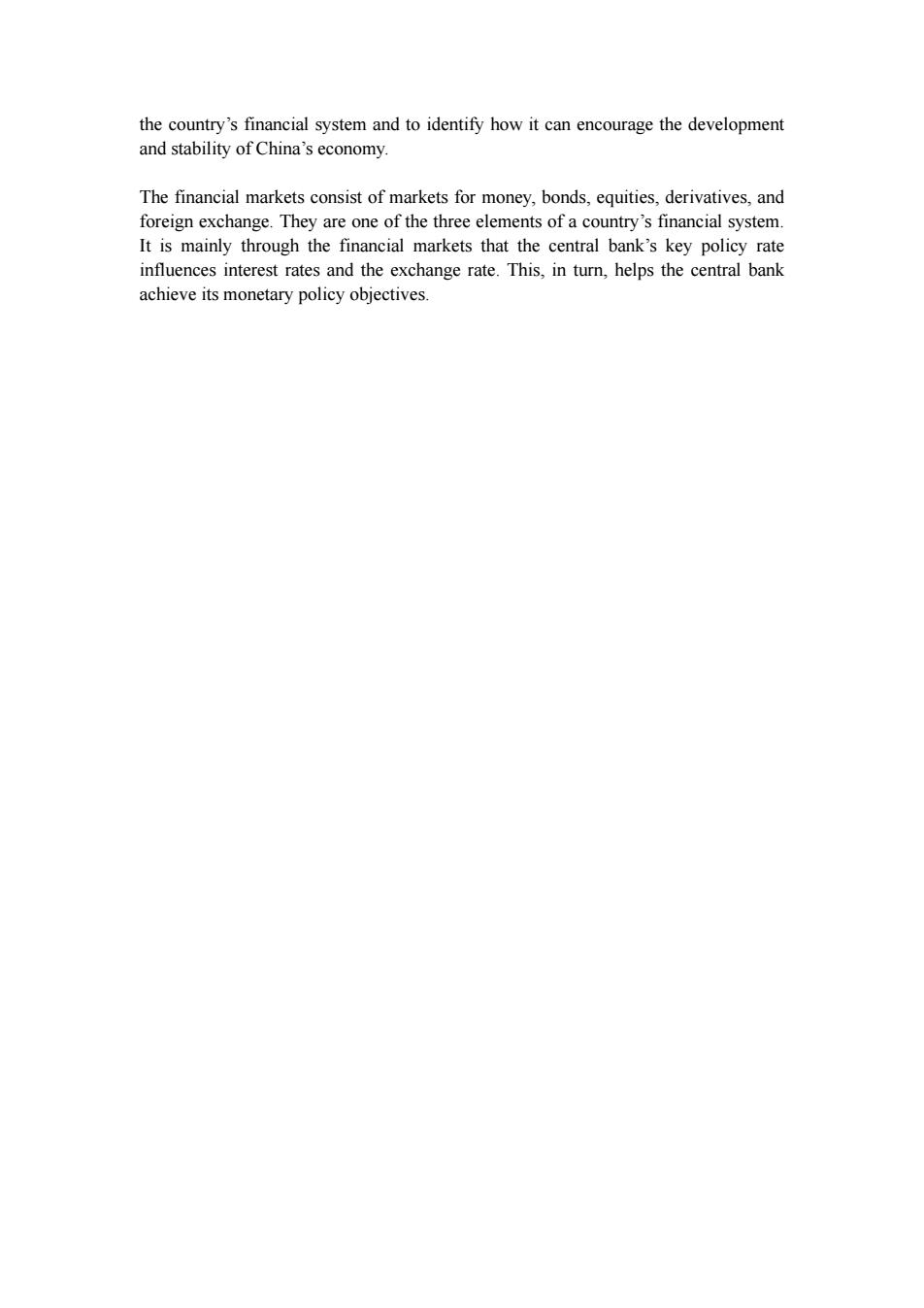
the country's financial system and to identify how it can encourage the development and stability of China's economy. The financial markets consist of markets for money,bonds,equities,derivatives,and foreign exchange.They are one of the three elements of a country's financial system. It is mainly through the financial markets that the central bank's key policy rate influences interest rates and the exchange rate.This,in turn,helps the central bank achieve its monetary policy objectives
the country’s financial system and to identify how it can encourage the development and stability of China’s economy. The financial markets consist of markets for money, bonds, equities, derivatives, and foreign exchange. They are one of the three elements of a country’s financial system. It is mainly through the financial markets that the central bank’s key policy rate influences interest rates and the exchange rate. This, in turn, helps the central bank achieve its monetary policy objectives